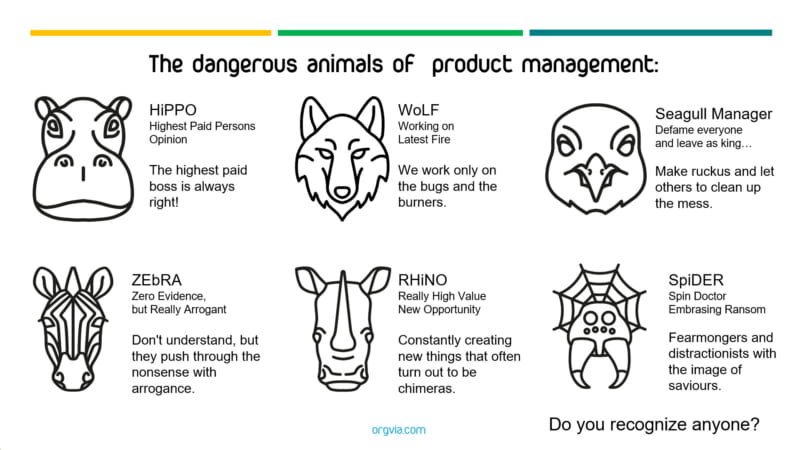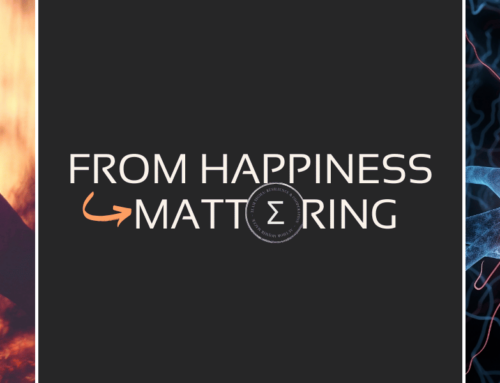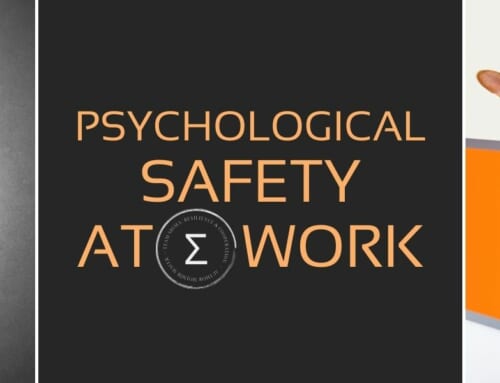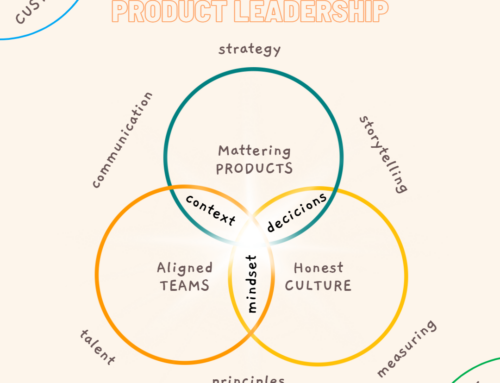Why are so many developers, designers and bosses constantly arguing with product managers or often waving their hands at nonsense instead of actively seeking solutions together? In my experience, it’s often a lack of respect + trust on both sides and a lack of leadership skills that block the smooth flow of cooperation across entire teams and partnership organisations. In many companies, the product manager is then often perceived as a clerk who has to dumbly confirm features for implementation on orders from above or from the customer, and that’s wrong. Often he becomes a slap in the face, who, after all, if he “freely” made the decision, is responsible for everything. Often, then, arrogant people and spider schemers proliferate in PM positions, who know best what and how and have a patent on reason. Or production people become task clickers, note takers, masters of forwards and operatives. Such companies are often common, which see the production manager as an operative who is supposed to drive people to results and occasionally whip them over the head. All of this then leads to clear consequences: rising costs; developing product features that almost no one uses; making and selling features that the customer doesn’t want and so we create an artificial need for them through manipulative marketing; the decline of significant innovation; competition to see who can pump/extract out more money + fees and grab more power in the company; to the swelling of the structures of not just the product divisions of companies. We have product managers, above them product group managers, heads of products, product directors and vice presidents of products, and board members with great decision-making powers. Product management then often becomes a competition to see who and where will direct the money pipeline to the right influencers and confuse the “sponsor” and degenerate into biased decision-making influenced by the power interests of career ladder climbers. Not to mention the evil in many startups, where the product is made for the sake of the product and to ensure the flow of money, instead of a meaningful and economically sustainable mattering product that customers will appreciate a lot especially financially…
It is a common reality in companies then that the six very dangerous animals of product management have a big impact on outcomes:

It is even said that there is a mythical animal that the teams call 6v1, and I once met him in practice, but I preferred to leave the company and did not have time to paint the animal. 🙂 What does it looks like? What do you think? 😉
Many product managers don’t understand the purpose of their job, they artificially got into their position from other parts of the company and often had no one to learn good practices from, develop so much-needed diversity of skills and positive character traits, let alone leadership. Yet great product management is critical to a company’s success in the marketplace and its reputation and customer trust.
Yes, the first swallows of companies that make products/services that make a lot of sense to their creators and have superior added matteroing value for customers/users in the real world are emerging. Such companies have several main characteristics in common:
- Expert leadership is left as far down as possible, to people who understand their work = senior LEADERS who can coach less experienced colleagues and help them on a daily basis to find ways to overcome blocks in their work and find better methods to tighten up the quality of product fictions in line with the desired features/outputs;
- projects are not managed by Mr. Forward or Mrs. Forwardees, coordinators or push-up project managers, but by MEDIATORS who are perfectly adaptable at mediating communication within teams and across the company/companies;
- can focus on the essential organic information in teams instead of the instant flood of data and the now so-modern mania to measure every fart;
- successful companies also have good financial management and, most importantly, a navigator – a STRATEGIST with intuition who can use their experience to steer the rudder correctly and constantly fine-tune teamwork, create great conditions for the crew and have the courage to choose even unconventional and new paths. And above all, he can not only give clearly feedback to teammates but most importantly, with humility, accept feedback!
- a great production manager, then, is good at motivating teams to solve meaningful problems, not afraid to get down to the nitty-gritty and keeping a distance from operations and delivering detailed tasks or micromanagement madness. That’s what implementation team leaders = MRTeers 😉 are for. It’s bad when a production manager directly tasks people, has to act as a supervisor and approve the takeover of every task/story or resigns to the WHY question and becomes a boss wish fulfiller and medal hunter for meeting KPIs that are often set by people without knowing the context. Product management is a discipline that combines the thinking skills of a businessman, the heart of a designer, the brain of an engineer, the listening skills of a diplomat, the courage of a lion and the honor and skill of a phoenix saying no!. These are all qualities that only a high-quality product LEADER with diverse experience and professional overlap can combine with the courage to face animal ideas;
If a product leader is not a great courageous positive leader, teams will fail to create above-average competitive products.
Why is leadership so important to successful productivity and competitiveness in global world?
- Great product teams have no hierarchy; they are teams of equal
collaboratorscooperators. Command and control don’t work in creative work. Self-directed & self-organizing teams are much more effective. - Quality and reliance on shared knowledge in context across teams is essential
- trust in team members and keeping decision-making authority as close to the problem as possible is key
- people are different and something works differently for everyone, so it’s good if a producer can be a partner/mentor/facilitator/negotiator or sometimes just a simple observer who can give feedback in a clear (sometimes public / sometimes only strictly personal) and honest way and is not afraid to suggest change and activate all the powers to move on
Which good techniques are working in practice?
The basis is the constant mutual prioritization and optimization of team members’ use of time in cooperation between the product LEADER, the MEDIATOR and the team’s expert GUIDE. In such regular clarification meetings, it is the task of the product leader to bring new features to the solution table and to take care of their understanding by others, to refine the assignment together and to clearly define the objectives – deliverables. Based on the requirement, it is then possible to jointly design a solution. A good rule of thumb is to stick to the principle of “simplicity” and MVP concepts when negotiating together, so that we do not build a supersonic cannon on a mosquito. To do this, the role of all team members is then essential to keep the cloudy ideas grounded and ensure their feasibility and delivery on solid ground. It’s a knack to always maintain a reasonable amount of latitude and creativity for the team and to remember WHY? The main goal of such a meeting is mutual “understanding”.
In detailed sprint planning, the product LEADER should be more in a listening role with a clear vision and should not define milestones/goals and their execution strategy as a lone ranger. It is up to the team to understand and accept the goal as theirs and figure out how to implement it. This is where the key role of trust in the team and its members comes in. The team should work out the individual storks/tasks leading to the delivery of the fiction in an optimal way and with the required quality, following the guidance of the LEADER.
Daily STANDUPs are about listening on the part of the PRODUCER and certainly should not, as sometimes happens, degenerate to discuss changes in priorities. This all benefits from having a separate system for product management and developer operations and tasking so that everyone can concentrate fully on their work and not be distracted by the “what if” considerations that we in the Czech cauldron are big on.
Every work makes more sense when the author can present and deliver it in person. Sprint reviews are the right place to present and deliver the results. The activity must come from the “bottom” of the team members themselves. It is wrong when the deliverables are presented by the production person to the sponsors (stakeholders/customers) and substitute the creator. Again, the producer should be in the role of listening to all stakeholders and then prepare a possible change proposal for further development.
Completely underestimated in companies are retrospectives, which should not serve as a show of bragging or grumbling, but cultivate openness, honesty, sincerity and constructiveness. It’s all about identifying what to improve and, most importantly, agreeing on steps – actions on what can be further tweaked in the functioning of teams. To keep the sense of retrospectives alive, the pro online tools available are then good to use for their variety, engagement and liveliness. The worst thing is when a retrospective degenerates into a formality because “It has to be!”.
A few reflections in conclusion:
I dislike the functional labels “product manager”, “development manager” as much as “project manager”, etc. In my opinion, we have/are over-managed and forgotten the purpose of each profession. Product Management is definitely one of the key functional areas – competence clusters, that every company should cultivate and focus deeply on. I think it is the advances in the psychology of how teams function and innovations in management and how we organize, that will make PM one of the key disciplines that will evolutionarily change how companies currently operate in pyramid models. The future will belong to the innovutors and organizations that master the adoption of competency cluster-based functioning in dynamic decentralized structures and abandon the outdated concepts of falling down the crapper and colonial behaviour of pegging their influence and power over other people and ladder-jumping. The companies that maintain a balance between sometimes creative chaos and productive order will own the future and only they -those – we will survive.
Sincerely and with respect Mojmir Macek
P.S. Have you ever tried asking your team members a very short question:
What is the purpose of your work?
Try it, the (non)answers will more than surprise you.





